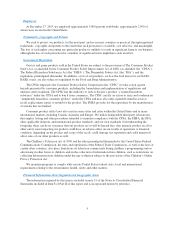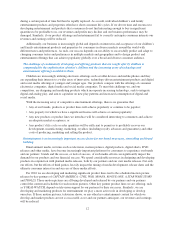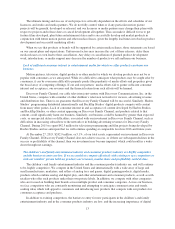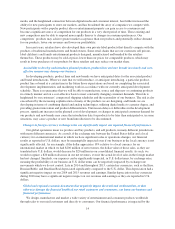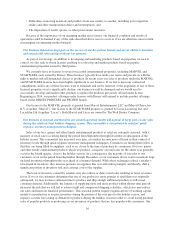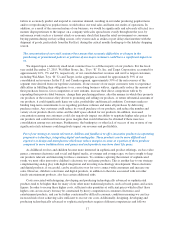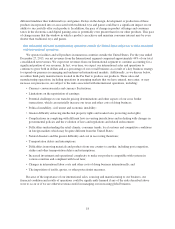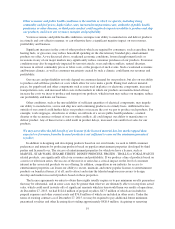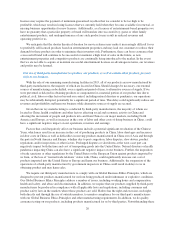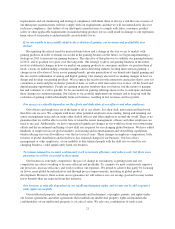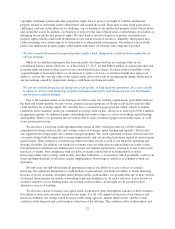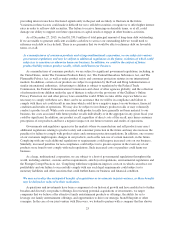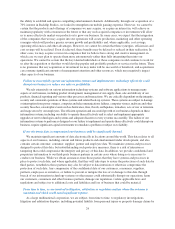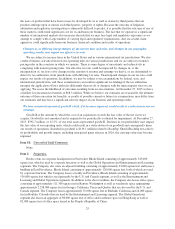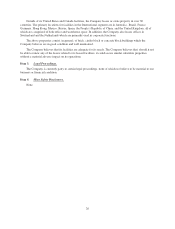Hasbro 2015 Annual Report Download - page 30
Download and view the complete annual report
Please find page 30 of the 2015 Hasbro annual report below. You can navigate through the pages in the report by either clicking on the pages listed below, or by using the keyword search tool below to find specific information within the annual report.Other economic and public health conditions in the markets in which we operate, including rising
commodity and fuel prices, higher labor costs, increased transportation costs, outbreaks of public health
pandemics or other diseases, or third party conduct could negatively impact our ability to produce and ship
our products, and lower our revenues, margins and profitability.
Various economic and public health conditions can impact our ability to manufacture and deliver products
in a timely and cost-effective manner, or can otherwise have a significant negative impact on our revenues,
profitability and business.
Significant increases in the costs of other products which are required by consumers, such as gasoline, home
heating fuels, or groceries, may reduce household spending on the discretionary branded-play entertainment
products we offer. As we discussed above, weakened economic conditions, lowered employment levels or
recessions in any of our major markets may significantly reduce consumer purchases of our products. Economic
conditions may also be negatively impacted by terrorist attacks, wars and other conflicts, natural disasters,
increases in critical commodity prices or labor costs, or the prospect of such events. Such a weakened economic
and business climate, as well as consumer uncertainty created by such a climate, could harm our revenues and
profitability.
Our success and profitability not only depend on consumer demand for our products, but also on our ability
to produce and sell those products at costs which allow for us to make a profit. Rising fuel and raw material
prices, for paperboard and other components such as resin used in plastics or electronic components, increased
transportation costs, and increased labor costs in the markets in which our products are manufactured all may
increase the costs we incur to produce and transport our products, which in turn may reduce our margins, reduce
our profitability and harm our business.
Other conditions, such as the unavailability of sufficient quantities of electrical components, may impede
our ability to manufacture, source and ship new and continuing products on a timely basis. Additional factors
outside of our control could further delay our products or increase the cost we pay to produce such products. For
example, work stoppages, slowdowns or strikes, an outbreak of a severe public health pandemic, a natural
disaster or the occurrence or threat of wars or other conflicts, all could impact our ability to manufacture or
deliver product. Any of these factors could result in product delays, increased costs and/or lost sales for our
products.
We may not realize the full benefit of our licenses if the licensed material has less market appeal than
expected or if revenue from the licensed products is not sufficient to earn out the minimum guaranteed
royalties.
In addition to designing and developing products based on our own brands, we seek to fulfill consumer
preferences and interests by producing products based on popular entertainment properties developed by third
parties and licensed to us. The success of entertainment properties for which we have a license, such as
MARVEL, STAR WARS, SESAME STREET, DISNEY PRINCESS, FROZEN , TROLLS or YOKAI-WATCH
related products, can significantly affect our revenues and profitability. If we produce a line of products based on
a movie or television series, the success of the movie or series has a critical impact on the level of consumer
interest in the associated products we are offering. In addition, competition in our industry for access to
entertainment properties can lessen our ability to secure, maintain, and renew popular licenses to entertainment
products on beneficial terms, if at all, and to attract and retain the talented employees necessary to design,
develop and market successful products based on these properties.
The license agreements we enter to obtain these rights usually require us to pay minimum royalty guarantees
that may be substantial, and in some cases may be greater than what we are ultimately able to recoup from actual
sales, which could result in write-offs of significant amounts which in turn would harm our results of operations.
At December 27, 2015, we had $124.4 million of prepaid royalties, $47.5 million of which are included in
prepaid expenses and other current assets and $76.8 million of which are included in other assets. Under the
terms of existing contracts as of December 27, 2015, we may be required to pay additional future minimum
guaranteed royalties and other licensing fees totaling approximately $426.4 million. Acquiring or renewing
19


